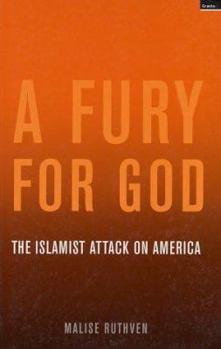A Fury for God: The Islamist Attack on America
Select Format
Select Condition 
Book Overview
A respected scholar and bestselling writer on the subject of Islam examines what lay behind the attack of 11th September 2001. This description may be from another edition of this product.
Format:Paperback
Language:English
ISBN:1862075409
ISBN13:9781862075405
Release Date:January 2002
Publisher:Granta Books (Uk)
Length:324 Pages
Weight:1.05 lbs.
Dimensions:1.1" x 6.0" x 9.2"
Customer Reviews
3 ratings
A new analysis of U.S. policies in the Middle East
Published by Thriftbooks.com User , 20 years ago
Malise Ruthven's revised, updated survey has been expanded with a new analysis of U.S. policies in the Middle East and the `war on terror' since 9/11: add this expansion to a fine scholarly survey of Islamic history and the religious and intellectual growth of the region and you have an in-depth college-level analysis of the history and causes of the rise of militant Islam.
Excellent Introduction to Islamic Radicalism
Published by Thriftbooks.com User , 20 years ago
For the reader who wants to understand the background of Islamic radicalism, this book is an excellent starting point. Ruthven gives an entertaining and insightful introduction to the early Islamic radicals whose thoughts influence Usama Bin Ladin and other radicals of today. His descriptions of the early leadership of the Muslim Brotherhood is excellent and makes us understand, at least in part, the motivations that lead to some early terrorist events. Recommended highly.
What makes extremists tick?
Published by Thriftbooks.com User , 22 years ago
Amidst all the paranoid, hysterical and bigoted writings that have flooded the market in the wake of 9/11 Malise Ruthven's "A Fury for God" is a beacon of restraint. Except for the somewhat overly dramatic first chapter this book is a serious attempt to trace the roots of the seeming incomprehensible fury unleashed against anything American in the late Summer of 2001.Although, in his preface, he makes no claims to great originality, Ruthven's approach of the subject matter is refreshingly different from most other books, the vast majority of which run aground in superficial treatment and overly easy conclusions regarding the motivations of Muslim extremists. It is a bit of a pity that Ruthven did not resist the temptation to graft his narrative on the dramatic imagery of eyewitness accounts. But he quickly makes good on this by shifting to a philosophical approach. For this the author brings with him a solid grounding in religious studies. Although his specialism is indeed Islam, it becomes obvious that he is also conversant with the broader field of comparative religion, enabling him to draw parallels with Christian and even Hindu traditions.One of the most important points he makes in the first chapter is the key realization of the incommensurability of fundamentalist and more liberal thought patterns. Where the latter tend to see religions as 'cummulative traditions', a syncretism of various cultural influences, the former search for pristine faith: with clear-cut and neat oppositions. Fundamentalists are hardcore dualists, says Ruthven, reducing the world to the Manichaean dimensions of good and evil. In fact, for fundamentalists, faith IS Manichaean. A very interesting observation in this context is that, in that sense, the religious views of many Americans are equally dualist. As Ruthven points out American diplomacy has a distinctly 'Manichaean' streak because American politics has deep biblical and puritan roots. A major difference between fundamentalist Muslims and fundamentalist Protestants is however how far they are willing to carry their literalism. In the remainder of the book Malise Ruthven sets out to uncover the genealogy of Islamic fundamentalism. The writer commences with an extensive historical examination of the Jihad doctrine, beginning with its Quranic origins in the so-called "Sword Verse", he moves on to the importance of the rapid territorial expansion of the Islamic empire during its first generation, and introduces later-day conceptualizations such as the differentiation between individual and collective obligations to defend the faith, and religious warfare as a sociological agent. Ruthven also signals the centrality of the rewards of martyrdom in Jihad doctrine.Probably the most revealing chapter of the book is "The Aesthetics of Martyrdom". Here Ruthven tries to make sense of the intellectual heritage left by one of the chief ideologists of fundamentalist Islam: Sayyid Qutb. Most source books on Muslim radical






